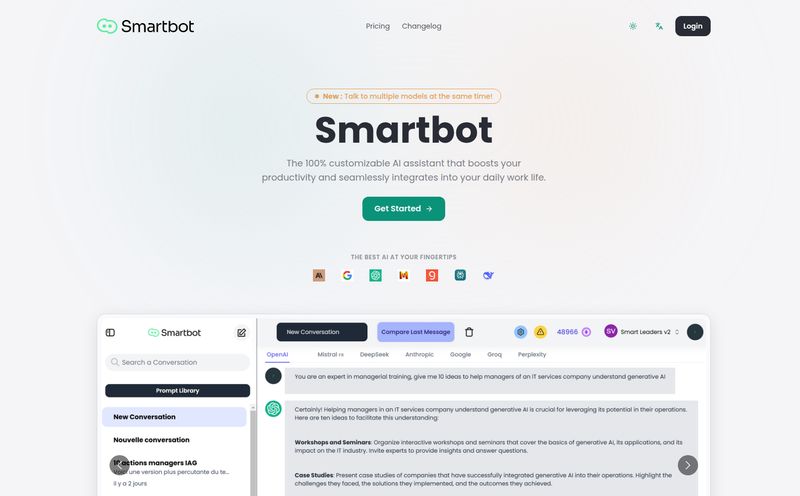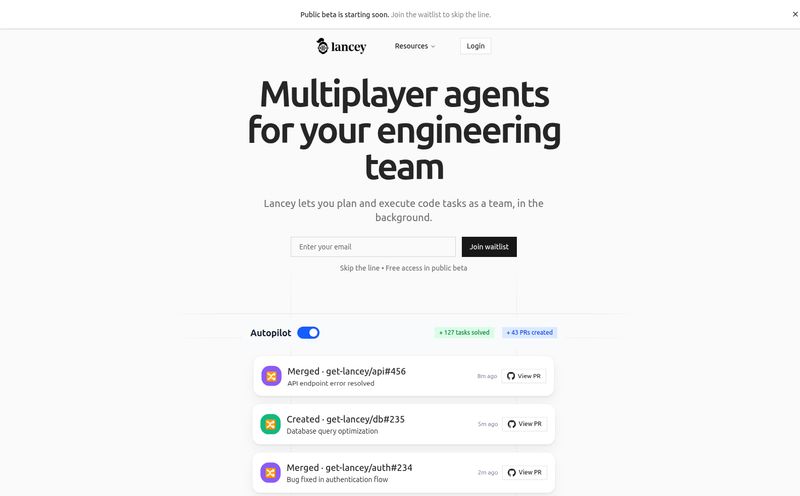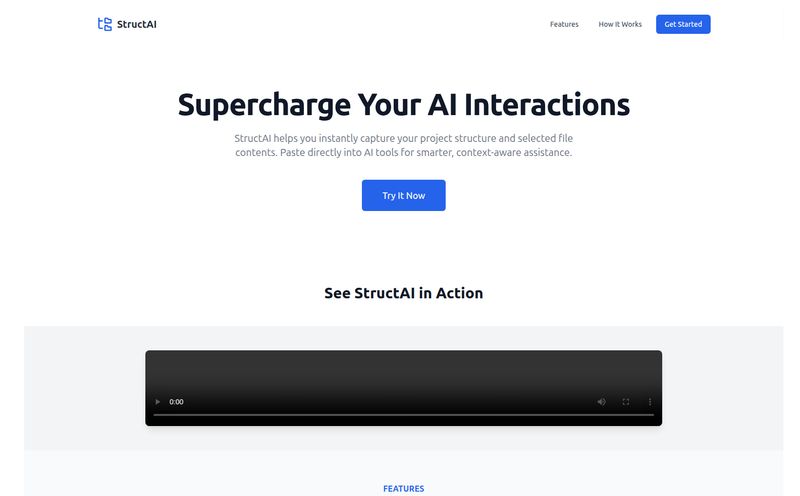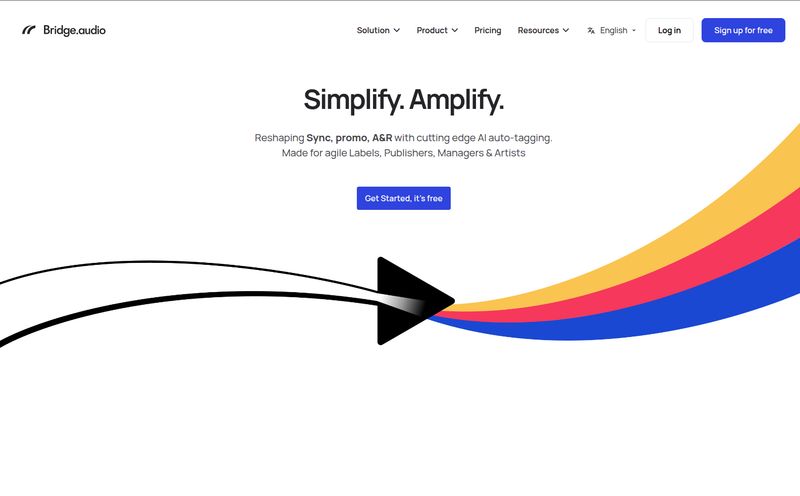How does your morning actually start? If it’s anything like mine was, it’s a chaotic symphony of digital noise. The alarm blares. You grab your phone. You’re immediately assaulted by a tidal wave of notifications: Slack messages from the overnight team, a dozen emails that are mostly spam, calendar alerts for meetings you forgot about, and a little red bubble on your to-do app mocking you with yesterday’s failures. It’s exhausting. And you haven't even had coffee yet.
For years, I've been on a quest for the holy grail of productivity: a single source of truth. One place to see what my day really holds, without having to hop between five different apps. I've tried everything from fancy project management software to old-school paper planners. Nothing quite stuck. They either required too much manual input or just became another notification to ignore. Then, I stumbled upon a nifty little tool called dailydebrief.io. And honestly? It's been a bit of a game-changer.
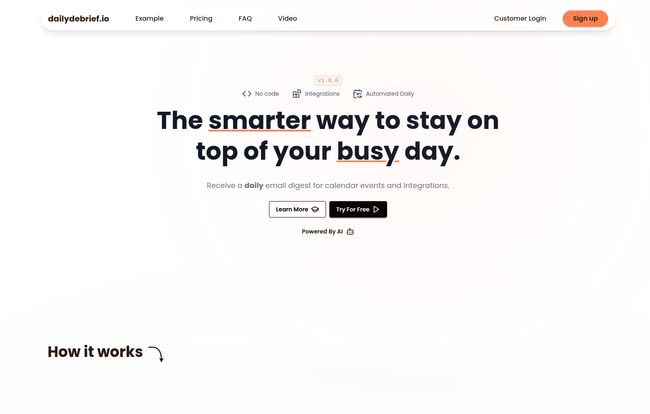
Visit dailydebrief.io
So, What Exactly Is Daily Debrief?
Picture this: you have a personal assistant. Every morning, before you even start work, they slip a neat, one-page summary under your door. It has your appointments for the day, a reminder about that important task you need to tackle, and maybe even a note about how your run was yesterday. That's Daily Debrief in a nutshell. It’s an AI-powered service that connects to the apps you already use—your calendar, your to-do list, even your Strava—and emails you a single, digestible summary of your day. It’s your day, digested in one email.
It's not trying to replace your calendar or your task manager. Nope. It’s more like a friendly concierge for your digital life. It pulls the most relevant bits of information from your scattered digital world and presents them to you in a clean, simple format. The whole point is to give you a bird's-eye view so you can start your day with intention, not reaction.
Getting Started and How It All Works
Setting it up is ridiculously simple, which is a huge plus in my book. As a no-code tool, you don't need to be a developer to get it running. You just sign up, connect your favorite apps through their secure integration process, and… well, that’s pretty much it. The AI takes over from there.
The system intelligently scans the recent data from your connected services. It looks at your Google Calendar for today's events, checks your Todoist for high-priority items, and pulls your latest workout from Strava. Then, its AI crunches this data and composes a unique email just for you. Every single day.
Choose Your Daily Vibe: Wordy or Visual
Here’s a touch I really appreciate. We all process information differently, right? The creator of Daily Debrief, Jack Sansom, clearly gets this. You get to choose the style of your daily email summary. You’ve got two options:
- The Wordy Email: This is my personal favorite. It’s a narrative-style email that reads like a personal note from a very organized friend. It weaves your tasks and appointments into conversational sentences.
Good morning! You've got that meeting with Olivia at 11 AM today, don't forget to prep. Also, that 'frontend fixes' task is still open, maybe give it a poke?
It feels surprisingly human. - The Visual Email: If you're more of a skimmer, this one's for you. It uses clear sections, emojis, and concise lists to present the information. It’s clean, scannable, and gives you the facts at a glance. Perfect for when you have exactly 30 seconds to get the gist of your day while the kettle boils.
This little bit of customization makes the tool feel much more personal than a generic, one-size-fits-all solution.
The Good, The Bad, and The AI
No tool is perfect, and as an SEO professional, I'm professionally skeptical of anything that promises to magically organize my life. So, let's get into the real pros and cons I've found after using dailydebrief.io for a while.
The Big Wins
The most obvious benefit is the time saved. I've probably clawed back a solid 15-20 minutes each morning that was previously spent frantically context-switching between apps. It doesn't sound like much, but that's focused time I can now use to actually plan my strategy for the day. The mental clarity that comes from starting with a clear overview, instead of a digital firehose, is invaluable. My productivity has genuinely improved because my first hour is no longer a reactive mess.
Some Things to Consider
Now for the other side of the coin. To make this work, you have to connect your apps. For some, this will raise immediate privacy concerns. You're granting a third-party service access to your calendar and tasks. The site talks about data security, but it’s a valid hurdle for the more privacy-conscious among us. It's a trade-off: convenience for data access. For me, the limited scope of what it's reading makes it a comfortable trade, but your mileage may vary.
Another point is that the AI summary is only as good as the data you feed it. If your to-do list is a mess or your calendar isn't up-to-date, the summary won't be very helpful. It’s a tool for organization, not a magic wand that organizes for you. Finally, the AI, while clever, can sometimes miss nuance. It might not grasp that a vaguely-named calendar event is actually the most critical meeting of your week. It gives a great summary, but it's not a substitute for human judgment. Not yet, anyway.
Let's Talk About the Price. Or Lack Thereof.
Okay, this is the part that made me do a double-take. The pricing for dailydebrief.io is… $1 per month. Yes, you read that right. One. Dollar. The landing page literally says, "It's Just 1 Coffee A Month..." and honestly, they're overestimating the price of my coffee. In a world where every half-decent SaaS tool wants to charge you $20, $50, or even more per month, this is refreshingly straightforward and absurdly affordable.
For the price of a single pack of gum, you get a tool that can genuinely make your mornings more peaceful and productive. This pricing model makes it a complete no-brainer to at least try. It removes the entire barrier to entry. There’s no complex tier system, no enterprise plan, just a simple, honest price for a useful service.
"I created this tool to help busy bees stay ontop of the absurd amount of technologies we rely on every day! It can be very time consuming checking them all in the morning when you could be doing something more productive... like drinking a coffee and reading your email. Be productive, use dailydebrief."
Seeing the note from the creator, Jack, on the site sealed the deal for me. This isn't some faceless corporation; it's a tool built by someone who felt the same pain point we all do. That authenticity is something I can get behind.
Frequently Asked Questions About Daily Debrief
Is Daily Debrief secure?
Security is a primary concern with any app that accesses your data. Daily Debrief uses industry-standard authentication methods (like OAuth) to connect to your apps, meaning it doesn't store your passwords. While you are granting it access to read data, the business model seems focused on providing the service, not monetizing your data. As always, review the privacy policy to make sure you're comfortable.
What tools can I integrate with Daily Debrief?
Currently, it supports major productivity tools like Google Calendar, Todoist, and even fitness apps like Strava. The list of integrations is likely to grow over time, but it already covers the core bases for most people's daily planning needs.
Can the AI summary replace my need to check my apps?
I would say no. It’s a summary and a primer for your day, not a complete replacement. It’s designed to give you a high-level overview to get you started. You'll still need to dive into your calendar for meeting details or your task manager to check off sub-tasks. Think of it as the executive summary, not the full report.
Is it difficult to set up?
Not at all. The entire process takes just a few minutes. You create an account, click to connect your desired services, and authorize the connection. It's a completely no-code, user-friendly experience.
For $1 a month, what's the catch?
That's what I wondered too! But there doesn't appear to be one. It's a simple, effective tool with a straightforward, incredibly low price. The "catch," if you can call it that, is that it's a focused tool that does one thing well, rather than a bloated platform with a million features you'll never use.
My Final Verdict on Daily Debrief
So, is dailydebrief.io worth it? For a single dollar a month, my answer is an enthusiastic yes. It's not going to overhaul your entire company's workflow, and it won't magically do your work for you. But that's not what it promises. It promises to give you a smarter, calmer way to start your day, and it absolutely delivers on that.
It’s a simple solution to the very modern problem of digital overload. If you're a freelancer, a manager, a developer, or just anyone who feels like they're drowning in a sea of tabs and notifications each morning, give it a shot. You might just get your mornings back. And for the price of... well, practically nothing... it’s an investment in your own sanity.
